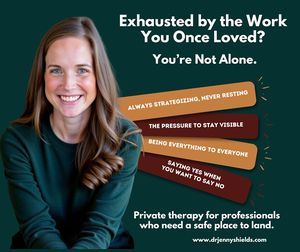- Categories :
- More
Categories
What Is Moral Distress? (And Why It’s Not Just Burnout)

Have you ever felt a quiet grief at work that has nothing to do with being tired? It’s the knot in your stomach when you know the right thing to do, but your hands are tied. This is the ache of compromised integrity, a feeling professionals across all fields are experiencing in silence.
It’s called moral distress, and it happens when your conscience and compliance collide. Learn what it is, how it differs from burnout, and why naming it is the first step toward healing.
What Is Moral Distress?
Moral distress is the emotional and psychological discomfort that occurs when you know the right thing to do but are prevented from doing it by institutional constraints or other barriers.
This isn’t confusion or lack of training—it’s clarity running into constraint. It’s the moment when your professional ethics and a system’s demands clash, and the system wins.
Over time, this leaves behind guilt, grief, and a sense of compromise that rest or resilience training can’t fix.
Examples of Moral Distress in Everyday Work
oral distress doesn’t only affect physicians making life-or-death decisions. It shows up across industries in daily compromises that slowly chip away at integrity:
Healthcare: A nurse who knows a patient needs more one-on-one time but is forced by productivity quotas to prioritize charting.
Education: A teacher restricted by standardized testing requirements from giving a struggling student the specific help they need.
Law: An attorney pressured to pursue a win-at-all-costs strategy that feels ethically questionable.
Nonprofits: A program director told to frame a report to satisfy donor expectations rather than reflect the community’s actual needs.
Corporate: An executive asked to downplay product safety risks to protect shareholder value.
“Moral distress is grief for the gap between what you know is right and what you’re allowed to do.”
Moral Distress vs. Burnout: Why the Difference Matters
It’s common to confuse moral distress with burnout, but they are distinct concepts with different solutions.
Concept Core Experience The Root Cause The Antidote
Moral Distress Grief, guilt, compromise Blocked ethical action Integrity, alignment, systemic change
Burnout Exhaustion, depletion Chronic, unmanaged stress Rest, boundaries, recovery
Trauma Fear, helplessness Threat to safety Safety, processing, connection
This distinction is critical. If we mislabel moral distress as burnout, we prescribe the wrong solutions—a vacation can’t heal an ethical wound.
Signs You May Be Experiencing Moral Distress
Unlike ordinary fatigue, these feelings don’t fade with a weekend off. They accumulate into what ethicists call moral residue—a lasting injury to your integrity.
Persistent guilt or shame without a clear source.
Disengagement from work you once cared deeply about.
A growing resentment you hesitate to voice.
A sense of complicity in actions that conflict with your values.
Feeling like you’re the only one who sees the ethical problem.
Why Naming Moral Distress Is an Act of Resistance
Without the right language, moral distress is misdiagnosed and the burden misplaced.
Individuals think, “I’m not resilient enough.”
Workplaces apply a bandage, offering “resilience training” instead of addressing systemic flaws.
Society normalizes ethical compromise as just the “cost of doing business.”
Naming moral distress is the first act of resistance. It shifts the narrative from, “I’m not strong enough,” to, “The system is asking me to compromise my ethics.” That clarity restores your agency and opens the door for change.
Steps Toward Reclaiming Your Integrity
There are no quick fixes for systemic problems, but these steps can restore your sense of agency and protect your well-being.
1) Name It with Precision.
Stop calling it “stress” or “burnout.” Use the right words: “I am experiencing moral distress.” Saying it to yourself or a trusted friend is a powerful first act. It shifts the blame from your perceived weakness to the external constraints you’re facing.
2) Find Solidarity, Not Just Support.
Venting can feel good, but solidarity is more powerful. Seek out a trusted peer—someone who understands your professional context—and ask: “Have you ever felt ethically conflicted in a situation like this?” You’re not just looking for a sympathetic ear; you’re looking for confirmation that your ethical concerns are valid.
3) Audit Your Alignment.
Look at your daily tasks. Where do you feel the most integrity? Where do you feel the most compromised? This isn’t about judging yourself, but about gathering data. Identifying the exact sources of distress can clarify whether the issue is a specific project, a team culture, or the role itself.
4) Advocate in Small, Strategic Ways.
You don’t have to be a whistleblower to make a difference. Advocacy can be as simple as asking a question in a meeting: “Can we pause to consider the ethical implications of this for our clients?” or “What are the potential human costs of prioritizing this metric?” These small acts can slowly chip away at the institutional silence.
5) Know Your Exit Ramp.
Sometimes, the most ethical choice is to leave a system that demands too much compromise. This isn’t failure—it’s an act of profound self-preservation and integrity. Consciously decide what your boundaries are before they are crossed, so you can recognize when a situation has become untenable.
You Are Not Alone
If you have been carrying this weight quietly, you are not weak. You are not broken. You are a person of integrity experiencing the profound strain of caring deeply in systems that too often make it costly to do so.
Naming your experience is the first step in reclaiming yourself—and in beginning to demand better from the systems we all work within.
From Naming to Healing
Naming moral distress is the first step. The next is finding a confidential space to process it without judgment. If you are a professional struggling with the weight of compromised integrity, you don’t have to carry it alone.
Dr. Jenny Shields specializes in helping professionals navigate burnout, moral distress, and ethical trauma. If this article resonates with you, learn more about consultation services or schedule a confidential appointment.
Frequently Asked Questions About Moral Distress
What is an example of moral distress? A teacher who knows a student needs extra help but is prevented by standardized testing policies from providing it is experiencing moral distress.
How is moral distress different from burnout? Burnout is exhaustion caused by chronic stress; moral distress is grief and guilt caused by being blocked from taking the right ethical action.
What professions experience moral distress? Healthcare, law, education, nonprofits, corporate leadership—anywhere people care deeply but are forced to compromise their values.
How do you cope with moral distress? You can begin by naming it, talking about it with trusted peers, seeking roles that align with your values, advocating where possible, and making choices that protect your integrity.
Is moral distress in the DSM-5? No. Diagnostic manuals do not currently include moral distress, which is part of why it often goes unrecognized and mislabeled.
Comments •











